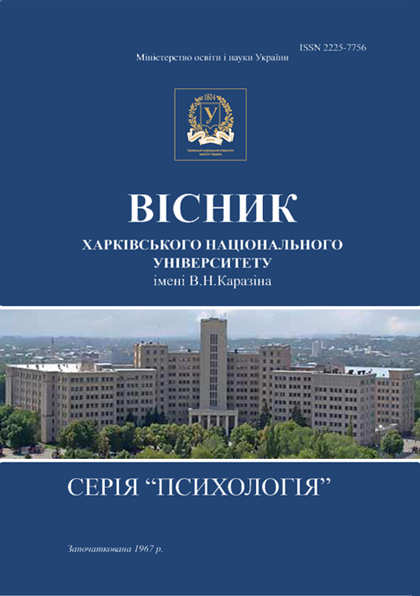PERSONAL MYTH «ATTITUDES TO BUSINESS» AS A FACTOR OF LIFE REALIZATION IN MODERN WOMEN
Abstract
The article deals with the peculiarities of the personal myth “attitude to business” as determinants of life realization of a modern woman. Life realization is interpreted in the concepts of ecological psychology and is defined as the highest level in organizing a person’s lifestyle. It is assumed that the type of relation to one’s own activity is reproduced by a person during the construction of his or her own living space.
The results of the empirical research on the attitude towards the main activity among 25-40 years old women are presented. The author’s narratives were interpreted as cognitive, emotional, target and motivational components of activity, which made it possible to detect differences in the ways of life-actualization of working women and housewives and to compare the myths of modern women in different types of activities.
The article gives a generalized description of the mythologemes “attitude to business”. The influence of the type of emotional relation to the activity and level of its awareness on the effectiveness of individual’s life-realization is determined. It is revealed that the social conditionality of labor negatively affects satisfaction both a chosen type of activity and organization of own life in general. It is shown that the presence of the personal meaning of the ongoing business and the positive attitude towards it is a major factor in the selfactualization of a woman in the chosen activity.
The content analysis of the narratives revealed that significant differences between the parameters of the mythologemes of working women and housewives are determined only by the criterion of motivation and orientation of work. Consequently, the type of leading activity is not a significant factor for the subjective feeling of realization of their own lives. It is important to have a woman’s subjective position, both during her activity and in the organization of living space. That is precisely what causes the emergence of positive emotions and the experience of the full value of their own lives.
Downloads
References
Лосев, А. Ф. Диалектика мифа /А.Ф. Лосев. – М.: Мысль, 2001. - 559 с.
Мясищев, В. Н. Психология отношений: избранные психологические труды / В. Н. Мясищев. – М.: Московский психолого-социальный ин-т, 2004. – 398 с.
Рубинштейн, С.Л. Проблемы общей психологи: учебное пособие. – М.:Просвещение, 1976. – 412с.
Улыбина, Е.В. Психология обыденного сознания: монография / Е.В.Улыбина. – М.: Смысл, 2001. – 266 с.
Чепелева, Н. В. Психологические механизмы понимания и интерпретации личного опыта / Н. В. Чепелева // Мова і культура (Науковий щорічний журнал). − Вип. 6. − Т. ІІ. Психологія мови і культури. Мова і засоби масової комунікації. − К. : Видавничий Дім Дмитра Бураго, 2003 − С. 25−33.
Швалб Ю.М. Просторово-психологічна організація середовища буття і життєдіяльності / Ю.М. Швалб //Актуальні проблеми психології: зб. наукових праць Інституту психології імені Г.С. Костюка НАПН України /за ред. С.Д. Максименка. – Київ; Ніжин: ПП Лисенко. – Т.7: Вип.40. – 2014. – c.198-207
Швалб, Ю.М. Целеполагающее сознание: психологические модели и исследования. – К.: Миллениум, 2008. – 152 с.
McLeester D. Welcome to Magic Theater: A Handbook for Exploring Dreams. – Worcester, MA: Saltus Press, 1976. – 368 p.




